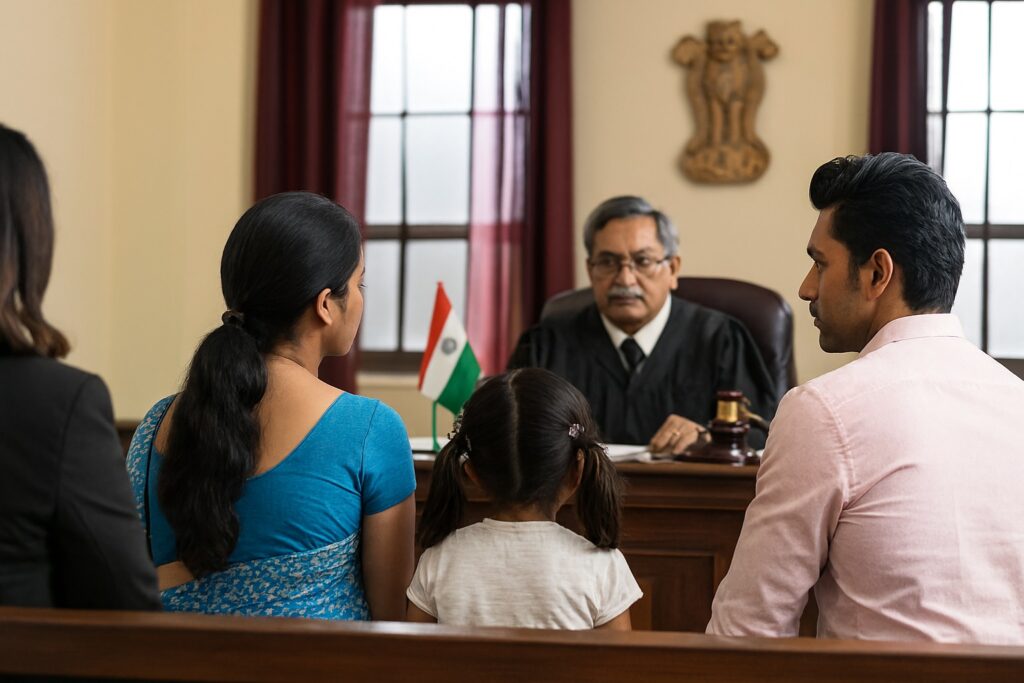Guided by Advocate Ketan Palshikar — Divorce and Family Lawyer in Pune
Divorce is never easy, especially when children are involved. Beyond the emotional and legal complexities, the most sensitive issue in any divorce case is child custody. Every parent wants what’s best for their child — but understanding how the law in Maharashtra determines custody rights is crucial to ensuring a fair and secure future for your child.
At Advocate Ketan Palshikar Pune, we handle divorce and child custody matters with deep sensitivity and a strong understanding of family law. Our goal is to protect your parental rights while ensuring the welfare of your child remains the top priority.

1. What is Child Custody?
Child custody means the legal right and responsibility of a parent to care for and make decisions about their child’s upbringing, including education, healthcare, and overall welfare.
Custody can be physical custody (where the child resides) and/or legal custody (the authority to make major life decisions).
In divorce cases, both parents may seek custody, but the Family Court in Maharashtra decides based on the best interests of the child, not merely on the parents’ preferences.
2. Legal Framework Governing Child Custody in India
Child custody matters in Maharashtra are governed by various personal and secular laws, depending on the religion and type of marriage:
- Hindu Marriage Act, 1955 (Section 26) – applies to Hindus, Jains, Sikhs, and Buddhists.
- Guardians and Wards Act, 1890 – applies to all communities in cases not covered by personal laws.
- Special Marriage Act, 1954 – for inter-religious marriages.
- Muslim Law – under which the father is the natural guardian, but custody (hizanat) of minor children is often given to the mother until a certain age, keeping the child’s welfare in mind.
- Christian and Parsi Laws – also prioritize the welfare of the child under their respective marriage acts.
Regardless of the personal law, the guiding principle across all legislations is “the welfare of the minor”.
3. Types of Child Custody
(A) Physical Custody
The parent with physical custody lives with the child and looks after daily needs like food, education, and care. The other parent is given visitation rights to maintain contact and bonding with the child.
(B) Joint Custody
Both parents share custody and responsibilities. The child may stay with each parent for a certain period — for example, alternate weeks or months. This arrangement promotes emotional balance and maintains the child’s relationship with both parents.
(C) Legal Custody
The parent with legal custody makes major decisions about the child’s education, health, and welfare. In some cases, both parents share legal custody even if only one has physical custody.
(D) Sole Custody
If the court finds one parent unfit due to abuse, addiction, or neglect, sole custody may be granted to the other parent. The unfit parent may have limited or supervised visitation rights.
4. Key Factors Considered by the Court
Family Courts in Maharashtra follow a child-centric approach while deciding custody. Some key considerations include:
- Welfare and best interests of the child.
- Age and gender of the child (younger children are generally given to the mother).
- Financial stability and lifestyle of each parent.
- Character and conduct of both parents.
- Education and living environment available to the child.
- Wishes of the child, if they are mature enough to express them (usually above 9–10 years).
- Emotional bond between the child and each parent.
The court prioritizes stability, safety, and emotional well-being over material comforts or financial capability. The decision is given solely in the best interest of the Child.
5. Custody During and After Divorce Proceedings
During a pending divorce case, one parent may apply for interim custody so that the child’s care continues smoothly until the case is decided.
After the divorce decree, the court grants permanent custody based on the final judgment. Even after granting custody, the Family Court retains the power to modify custody orders later, if circumstances change or the child’s welfare demands it.
6. Visitation Rights
The parent who does not get custody still retains visitation rights, ensuring that the child maintains a relationship with both parents.
Courts in Maharashtra often allow:
- Weekly or fortnightly meetings,
- Video calls in long-distance situations, or
- Overnight stays during holidays or festivals.
The court may impose conditions to ensure the child’s safety and emotional comfort during such visits.
7. Guardianship and Custody Are Different
It’s important to understand that custody and guardianship are not the same.
- Custody deals with day-to-day care and residence of the child.
- Guardianship refers to long-term responsibility for the child’s overall welfare and property.
A parent may have guardianship but not physical custody, depending on the court’s judgment.
8. Can Custody Orders Be Changed Later?
Yes. If either parent believes that the existing custody arrangement is no longer in the child’s best interest — for example, due to relocation, remarriage, neglect, or abuse — they can approach the court again for modification of custody.
The Family Court will review the situation and make a fresh decision prioritizing the child’s welfare.
9. Role of a Family Lawyer in Child Custody Cases
Child custody cases are emotionally and legally complex. A skilled Divorce and Family Lawyer ensures that your parental rights are protected while keeping the child’s welfare central.
At Advocate Ketan Palshikar Pune, we help clients:
- File or defend custody applications under relevant laws,
- Negotiate joint custody or visitation arrangements,
- Represent parents in Family Court proceedings, and
- Draft legally sound parenting plans that ensure minimal stress for the child.
10. Conclusion
In Maharashtra, child custody decisions are guided by one golden rule — the welfare of the child comes first.
Whether you are seeking custody or defending your parental rights, professional legal support can make a huge difference in presenting your case effectively.
For compassionate, strategic, and results-oriented legal assistance, consult Advocate Ketan Palshikar Pune, a trusted name in Divorce and Family Law.